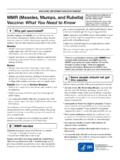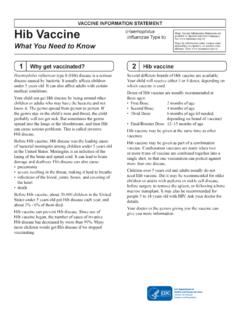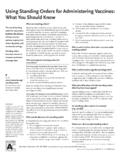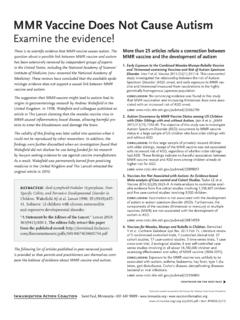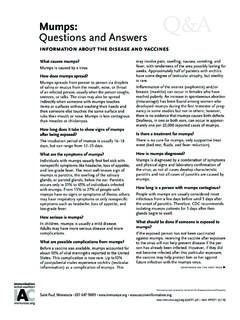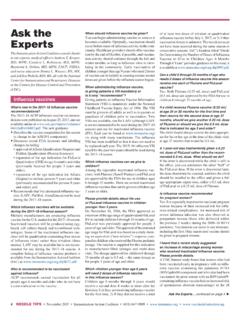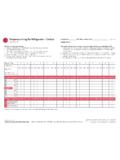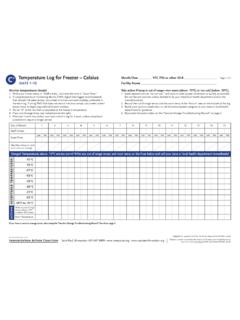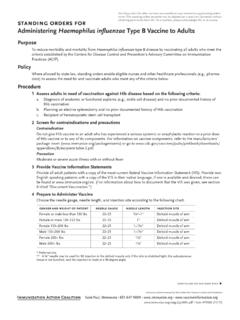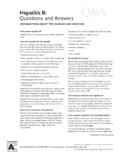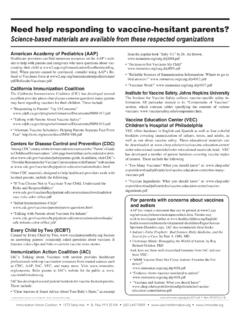Transcription of Quick Answers to with vaccine-hesitant Tough Questions ...
1 immunization action coalition (651) 647 9009 Item #S8030 (1/17)1 Quick Answers to Tough QuestionsVaccine Talking Points forHealthcare ProfessionalsUpdated January 2017 Are you spending more and more time with vaccine - hesitant parents? Effective, empathetic communication is critical in responding to parents who are considering not vaccinating their children Parentsshould be helped to feel comfortable voicing any concerns or Questions they have about vaccination Providersshould be prepared to listen and respond effectivelyTalking about vaccines A successful discussion about vaccines involves a two-way conversation, with both parties sharing information and asking Questions .
2 Talking with Parents about Vaccines for Infants (CDC) Questions Evaluatewhether the child has a validcontraindication to a vaccine by asking aboutmedical history, allergies, and previous experiences Assessthe parent s reasons for wanting to delay or forgo vaccination in a non-confrontational manner Have they had a bad experience? Obtained troubling information? Do they have a religious or personal beliefthat they think conflicts with vaccination?Talking about vaccines Take advantage of early opportunities such as the prenatal, newborn, 1-week, and 1-month visits to initiate a dialogue about vaccines.
3 These also are good opportunities to provide take-home materials or direct parents to immunization websites that you trust. This gives parents time to read and digest reputable vaccine information before the first and all future immunizations. And when parents have Questions , you can build on the reputable information that they already have reviewed. With parents who have many Questions , consider an extended visit to discuss vaccinating their child. Talking with Parents about Vaccines for Infants (CDC) If parents have safety concerns or misconceptions about vaccination, ask them to identify the source(s) of those concerns or beliefs Listen carefully, paraphrase to the parent what they have told you, and ask them if you have correctly interpreted what they have said Provide factual information in understandable language that addresses the specific concerns ormisconceptions the parent has about vaccinationImmunization action coalition (651)
4 647 9009 Item #S8030 (1/17)2Be prepared with Quick Answers to Tough Questions The following is an outlineof Answers to Questions about vaccine effectiveness and safety It includes: suggestionsfor further provider reading helpful handoutsfor patientsCommon Questions Asked by vaccine -HesitantParents and PatientsWon t giving my baby so many vaccines overwhelm his/her immune system? Babies begin being exposed to immunological challenges immediately at the time of birth. As babies pass through the birth canal and breathe, they are immediately colonized with trillions of bacteria, which means that they carry the bacteria in their bodies but aren t infected by them.
5 Healthy babies constantly make antibodies against these bacteria and viruses. Vaccines use only a tiny proportion of a baby s immune system s ability to respond. Though children receive more vaccines than in the past, today s vaccines contain fewer antigens ( , sugars and proteins) than previous vaccines. Smallpox vaccine alone contained 200 proteins;the 11 currently recommended routine vaccinescontain fewer than 130 immunologic don t you recommend spacing out vaccines using an alternative schedule? Delaying vaccines increases the time children will be susceptibleto serious diseases.
6 -Measles:There were 667 cases of measles in the in 2014. The majority of people who got measles were unvaccinated. Measles is still common in many parts of the world including some countries in Europe, Asia, the Pacific, and Africa, and can easily be : This disease is especially dangerous in infants before they re fully vaccinated. In 2014, 32,971 pertussis cases were reported in the , and many more cases were undiagnosed. Requiring many extra appointments for vaccinations increases the stress for the child and may lead to a fear of medical procedures.
7 There is no evidence that spreading out the schedule decreases the risk of adverse Too Many Vaccines? What you should know ( vaccine Education Center, Children s Hospital of Philadelphia VEC) Multiple Vaccines and the Immune System (CDC) The Problem With Dr. Bob's Alternative vaccine Scheduleby Paul Offit, MD and Charlotte Moser Vaccines and Autism: A Tale of Shifting Hypotheses by Paul Offit, MD and Jeffery Gerber, MD Multiple Immunizations and Immune Dysfunction (Institute of Medicine Report) The Childhood immunization Schedule: Why Is It Like That?
8 (AAP) Parental Refusal of Pertussis Vaccination Is Associated with an Increased Risk of Pertussis Infection in Children (Glanz et al, Pediatrics, June 2009) action coalition (651) 647 9009 Item #S8030 (1/17)3 Hasn t the mercury in vaccinesbeen shown to cause autism? The form of mercury found in thimerosal is ethylmercury(not methylmercury, which is the form that has been shown to damage the nervous system.) Although no evidence of harm has been proven, thimerosal was taken out of vaccines in the as a precaution and because it can be (due to single dose vials, other preservative options) Since 2001, with the exception of some influenza vaccines, thimerosal has not been used as a preservative in routinely recommended childhood vaccines in the t the mercury in vaccinesbeen shown to cause autism?
9 (continued) Multiple studies comparing vaccinated and unvaccinated children have shown that thimerosal in vaccines does not cause autism. Studies of three countries compared the incidence of autism before and after thimerosal was removed from vaccines (in 1992 in Europe and 2001 in the ) and found no decrease in autism with the use of thimerosal-free Common vaccine Safety Concerns web page (CDC) Collection of related resources (IAC) Report on thimerosal (Institute of Medicine) Understanding Thimerosal, Mercury, and vaccine Safety (CDC) conversations/ References (continued) Thimerosal: What you should know (CHOP) Autism.
10 What you should know (CHOP) Studies on Thimerosal in Vaccines (CDC) Vaccines and Autism: A Tale of Shifting Hypothesesby Paul Offit, MD and Jeffery Gerber, MD t the ingredients foundin vaccines hurt children?Aluminum Aluminum is used in some vaccines as an adjuvant an ingredient that improves the immune response. Adjuvants can allow for use of less antigen. They have been used for this purpose for more than 70 years. Aluminum is the most common metal found in nature. It is in the air and in food and drink. Infants get more aluminum through breast milk or formula than vaccines.
